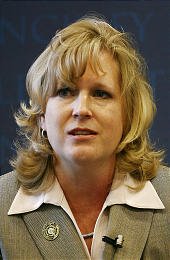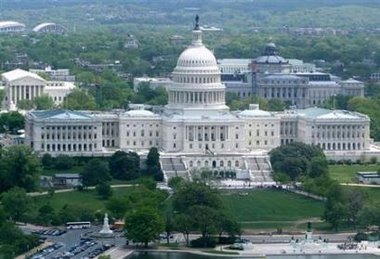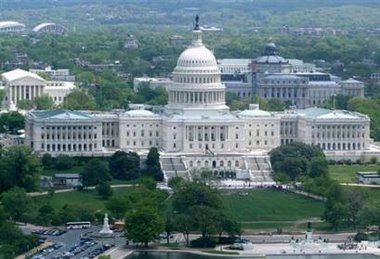Lohra Miller broke no law, prosecutors decide
The Republican candidate for Salt Lake County district attorney didn't break any laws by accepting third-hand campaign contributions from a property management company, a team of government prosecutors found.
Lohra Miller The prosecutors from the district attorney's and attorney general's offices ruled Wednesday that Lohra Miller did nothing illegal by accepting money from Wasatch Property Management employees even though there were accusations that the donations were forced. Former employee Shauna Hardy said she was one of 12 employees who allegedly received $2,000 bonuses and then were ordered to sign the cash over to Miller's campaign fund. Miller, who has claimed she was always open about contributions and did nothing illegal, said the ruling is vindication. "I hope that this is the end of the dirty campaigning, so now we can go back to focusing on the important issues of this race," Miller said. "I hope the voters can see this for what it is — it's just dirty campaigning just before the election." The investigation started after former University of Utah law professor John Flynn filed a complaint asking the district attorney to determine if the proxy contributions violated the law. County law says donors cannot make a contribution with someone else's funds. If elected officials knowingly accept the money from a contractor who works for the county, they could be charged with a class-B misdemeanor. After Flynn's complaint, the question of who should investigate seemed difficult. The problem was Attorney General Mark Shurtleff backs Miller, while District Attorney David Yocom is endorsing her Democratic opponent, Sim Gill. Both Shurtleff and Yocom declined to investigate, because of the obvious conflicts of interest, said Paul Murphy, spokesman for the Attorney General's Office. Instead, their respective staffs did the work.
The team of prosecutors said that since Miller is not an elected official and Wasatch Property Management does not have a contract with the county, no crime was committed. "Since the action complained of is not a crime, and further action would unnecessarily expend public funds investigating a matter that has no basis for prosecution, this concludes the matter for both prosecutors' offices," the attorneys wrote in a joint statement. Even so, Flynn said he still believes Miller and Wasatch Property Management violated the spirit of the law. "I think any voter would like to know who is paying for the campaign of the various candidates on the ballot," Flynn said. "If people hide contributions by playing games like this, I think that's inappropriate." To avoid problems like this in the future, Flynn said Utah campaigns should be publicly financed. Wednesday's ruling also clears Wasatch Property Management of any criminal liability, since the company does not have a contract with the county. Wasatch Property Management officials, including chief executive officer Dell Loy Hansen, did not return phone calls seeking comment. Matt Burbank, a political science professor at the University of Utah, said the incident illustrates why the district attorney's office should be nonpartisan. Both Miller and Gill agree. They said they believe a system needs to be set up to avoid the slightest appearance of political bias in cases requiring an investigation of elected officials or candidates. The two candidates, however, have different ideas on how to achieve that. Miller wants the Legislature to set a statutory procedure that district attorneys must follow in cases where political bias might come into play. She said the law should clearly spell out when a district attorney should be removed from a case, as well as what a conflict of interest is for the county's top prosecutor. Sen. Mark Madsen, R-Lehi, sponsored a bill in the 2006 legislative session that would have done just that but withdrew the bill and instead sent it to an interim study committee. "We can make a change beforehand, before the issue comes up," Miller said. "We've got to remove politics out of the office entirely." Gill said he wouldn't wait for the Legislature to take action. He said that within 90 days of taking office, he would set up a bipartisan advisory board made up of former judges and lawyers "that I hope I will never have to call upon." The board would review evidence and recommend whether the district attorney should file charges against an elected official. "It would establish integrity and trust for that office," Gill said of the board. "Politics absolutely has no place at the district attorney's office — period."












